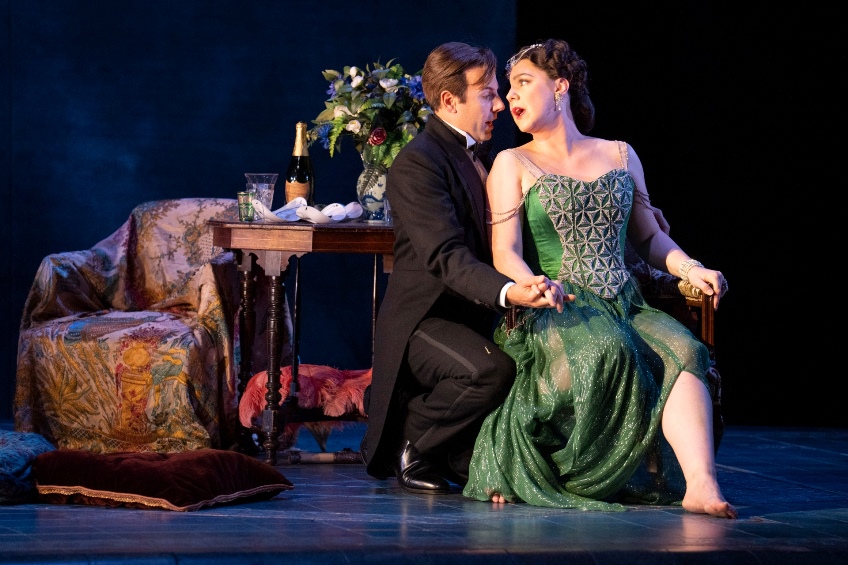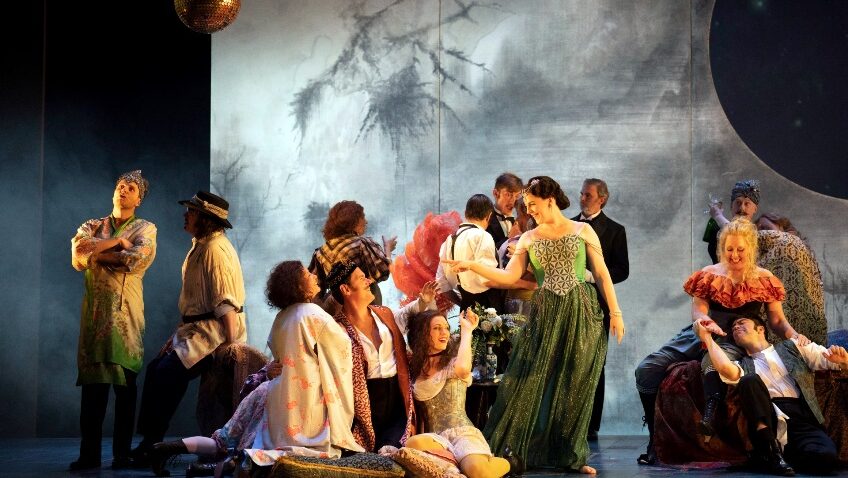With flamboyant, hedonistic abandon, Violetta’s life as an up-market courtesan whirls her through the ballrooms and bedrooms of vibrant Parisian high society and, as she recovers from a bout of illness (spoiler alert: for the time being!) she’s all set to carry on whirling. But then along comes young, naive, bourgeois Alfredo, genuinely head-over-heels in love with her. Eventually, in spite of herself, she falls for him, too, and leaving her immoral past and his noble family behind, the two embark on a life of romantic bliss together. What can possibly go wrong?
The gripping story of Verdi’s “fallen woman”, La Traviata, is based on La Dame aux Camelias, a controversial play written in 1852 by Alexandre Dumas (fils), adapted from his 1848 novel. Full of romance, seedy opulence, scandal, deceit, hypocrisy, selfishness, selflessness, ravaging disease, true joy and heartbreaking tragedy, this emotional drama is enhanced at every turn by Verdi’s glorious music. It’s not for nothing that La Traviata (even though it did flop originally) remains a firm favourite the world over amongst regular opera-goers and first-timers alike, while entertainments like Moulin Rouge, Priscilla Queen of the Desert and Pretty Woman and countless TV ads have eagerly shared in its eloquent musical hits and touching, timeless narrative.
In this revival of Opera North’s 2014 production, directed again by Alessandro Talevi, the story is set a few decades on, in the era of La Belle Epoque. As the prelude plays, through a Peeping Tom peephole a voyeuristic, ever-widening, monochrome eye peers across a mass of recumbent onstage figures, limbs dancing and snaking as they languidly writhe in intoxicated pleasure. From the pile of bodies rises Violetta in glittering green, standing in bright contrast to the beautifully subdued hues elsewhere as she sways in gentle seduction. Nothing too lurid!

Greatly appreciated by the audience is soprano Alison Langer’s compelling, sympathetic Violetta, her singing and acting conveying with conviction the progression of her emotions as expressed in Piave’s words and Verdi’s music. As she travels from hedonism to true love and then on to self-sacrifice, loss and despair, her initial carefree coloratura gives way to heartfelt joy, then breathless anguish. There are moving moments, too, in duets and interactions with paramour Alfredo, sung by fine Maltese tenor Nico Darmanin who, though rather stiff in body language a good deal of the time, does hit the fully engaging spot at others. A more visually enacted commitment to passion and menace would be all to the good in creating extra special chemistry more often. Immense spanners are thrown into the romantic works once Alfredo’s father, Giorgio, turns up to convince Violetta to give up Alfredo and sacrifice their mutual love for the sake of his family’s reputation. Damiano Salerno sings Georgio beautifully “bigly” and is at his best when eye contact and interaction with Violetta or Alfredo becomes more intimate, and having him in silhouette at the back, Alfred Hitchcock-style, is a nice added touch. Touching interaction with Violetta comes, too, from big-voiced, caring Doctor Grenvil, sung by Matthew Stiff.
While Victoria Newlyn’s gentle choreography maintains excellent stage-wide interest and atmosphere, the succinct subtitles are especially helpful for the occasional plot lurches. Madeleine Boyd’s costume and set designs also employ very handsome and effective simplicity: blue, sunny skies reflect love’s joyful bliss, while, in stark contrast, as Violetta lies on her deathbed of white sheets and blood-spotted pillow, sinister in the darkness behind sit voyeuristic carnival-goers in luminous white masks and gloves, drinking, smoking and silently staring. It’s a haunting, disconcerting sight that makes for a powerful finale. Beautiful moons nicely enhance the atmosphere of different scenes, too, though the oscillating, monochrome projection of tuberculosis bacilli and dark lungs do seem somewhat unnecessary.
As always the wide talents of the generous Opera North Chorus and delightfully full Opera North Orchestra, conducted by Jonathan Webb, contribute massively to the overall uplift and enjoyment of the entire piece, whether they’re being dreamy and languid at orgies, rousing and carousing in mighty choruses like Libiamo or creating bright comic relief as gypsies and bullfighters for the entertainment at Flora’s starlit ball (though the portrayal of Carmen’s violent stabbing in Bizet’s opera of a later date isn’t quite so much of a laugh).
All in all, the superb music is wonderfully sung and played as this riveting, devastating tale of passion, tender romance, destruction and breathtaking tragedy unfolds.
Eileen Caiger Gray
This production will also be performed in Newcastle, Nottingham and The Lowry at Salford Quays. Different singers alternate in the three main roles. You can find out more information by visiting the Opera North website by following this link.




